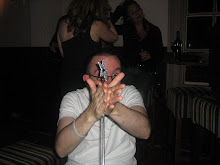 ruggles to find work eventually returning to the drugstore where he was once employed he earns a pittance and finds himself working under the man who was his assistant before the war. The only joy he finds is in meeting Al's daughter Peggy who helps him when he has nightmares, he falls for her but thinks he has a duty to Marie. After getting fired from the drugstore and finding out about Marie's other man he moves away and ends up helping at a building scheme to turn old scrapped airplanes into new buildings. Meanwhile Al has developed a bit of a drinking problem but is helped through it by his long suffering wife Milly, played by Myrna Loy, as wel as his two children. Al is promoted at the bank where he works because of his military service but later gives a loan to a former soldier who has no colaterall and is criticised by his boss. Homer's story is possibly the most interesting although he has lost both of his hands he still wants to be as indepedent as possible. His family and his 'girl' Wilma both try and act like they're find with what has happened but are both secretly upset. One of the film's most heartbreaking scenes is where Homer shows Wilma how helpless he his without his hands and that he always needs someone to help him before he goes to bed. This is meant to warn Wilma off but she decides to stick with Homer and the final scene is their wedding where Al and Millie are guests and Fred is the best man. The final shot is of Peggy and Fred's eyes meeting across the room and finally embracing as the film ends.
ruggles to find work eventually returning to the drugstore where he was once employed he earns a pittance and finds himself working under the man who was his assistant before the war. The only joy he finds is in meeting Al's daughter Peggy who helps him when he has nightmares, he falls for her but thinks he has a duty to Marie. After getting fired from the drugstore and finding out about Marie's other man he moves away and ends up helping at a building scheme to turn old scrapped airplanes into new buildings. Meanwhile Al has developed a bit of a drinking problem but is helped through it by his long suffering wife Milly, played by Myrna Loy, as wel as his two children. Al is promoted at the bank where he works because of his military service but later gives a loan to a former soldier who has no colaterall and is criticised by his boss. Homer's story is possibly the most interesting although he has lost both of his hands he still wants to be as indepedent as possible. His family and his 'girl' Wilma both try and act like they're find with what has happened but are both secretly upset. One of the film's most heartbreaking scenes is where Homer shows Wilma how helpless he his without his hands and that he always needs someone to help him before he goes to bed. This is meant to warn Wilma off but she decides to stick with Homer and the final scene is their wedding where Al and Millie are guests and Fred is the best man. The final shot is of Peggy and Fred's eyes meeting across the room and finally embracing as the film ends.The film's title The Best Years of Our Lives refers to a line in the film spoken by Marie in which she tells Fred that she gave up the best years of her life for him. But I think generally it refers to the time that three men spent in the war, that was the best years of their lives and now they are struggling to get their lives back on track. I mentioned The Hurt Locker because it resonated with the final scenes in which the Jeremy Renner character decided that he couldn't live his mundane life and decided to return to action. And indeed the men here find their lives mundane and things have changed a lot. The performances are faultless with two of the three leads winning Oscars for their roles. Frederic March won the Lead Actor Oscar however I would argue that Dana Andrews possibly desreved it more because Fred's journey is a lot bigger than Al's and Andrews gives a stunning portrayal of a man who just isn't coping. Harold Russell, as Homer, won Best Supporting Actor and also a Special Award for bringing hope and comfort for veterans who had been injured in the war. In fact Russell wasn't a professional actor and was spotted in a documentary about wounded serviceman by director William Wyler. Having found that out after watching the movie I'm suprised as Russell's performance was absolutely captivating, and he is only one of two non-actors to win an acting Oscar, the other being Haing S Ngor for The Killing Fields.
After the last two Oscar winning films I watched turning out to be fairly ordinary or overly theatrical its nice to watch a film that truly deserved all of the accolades that were given to it. A truly amazing piece of work that I would recommend to anyone.

No comments:
Post a Comment